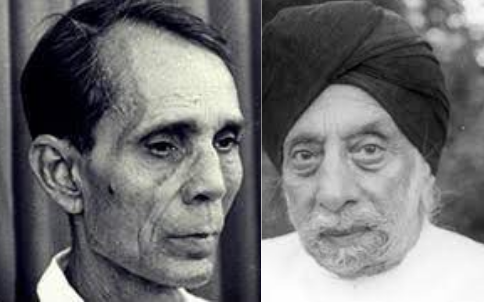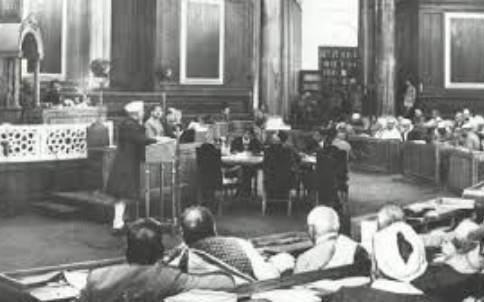Jawaharlal Nehru speaking in the Constituent Assembly
Are we worse than British?
K Hanumanthaiya famously remarked in the Constituent Assembly (CA), “ We wanted the music of Veena or Sitar, but here we have the music of an English band.” The Law of Sedition is that music Indian rulers are playing even after 74 years of Independence.
Also read: Supreme Court to limit abuse of Sedition and 153A IPC
With Chief Justice of India NV Ramana raising the criminal colonial hangover ‘sedition’ that is being abused against the dissent and criticism, the constitutionality of this crime is being discussed. The Constituent Assembly removed ‘sedition’ from the list of restrictions on press, but did not eliminate the roots since 1870 in Indian Penal Code, when this draconian crime was added.
Also read: CBI is saved from Directors of one week to few months, thanks to CJI
One socialist member of Constituent Assembly strongly criticised the continuation of ‘sedition’ as an offence even after Britishers left. Somnath Lahiri strongly challenged the need for the breadth of the restriction on free speech based on sedition. He wanted ‘sedition’ word be deleted from the sentence “Provision may be made by law to make the publication or utterances of seditious, obscene, blasphemous, slanderous, libellous or defamatory matter actionable or punishable”. He said:
……. these are fundamental rights from a police constable’s point of view and not from the point of view of a free and fighting nation. Here whatever right is given is taken away by a proviso. Does Sardar Patel want even more powers than the British Government—an alien Government, an autocratic Government which is against the people—needs to protect itself? Certainly not.
….here we find that none of the existing provisions of the powers of the executive has been done away with; rather in some respects those powers are sought to be increased. And if some of the amendments are passed—especially that of Shri Rajagopalachariar—it will in certain cases be even worse than the conditions obtaining at present. I will give one example. Here according to Sardar Patel a seditious speech is a punishable crime. If I say at any time in the future, or the Socialist Party says, that the Government in power is despicable, Sardar Patel, if he is in power at that time, will be able to put the Socialist Party people and myself in jail, though, as far as I know, even in England a speech, however seditious it may be, is never considered a crime unless an overt act is done. These are the fundamental bases of the fundamental rights of a free country, but here a seditious speech also is going to be an offence; and Shri Rajagopalachariar wants to go further. Sardar Patel would punish us if we make a speech, but Rajaji would punish us even before we have made the speech. He wants to prevent the making of the speech itself if in his great wisdom he thinks that the fellow is going to make a seditious speech.
Several members expressed fears that what was guaranteed under Article 19(1)(a) was taken away by the grounds of restriction listed in Article 19(2). The Constituent Assembly on April 29, 1947, discussed the Interim Report on Fundamental Rights.
Also read: Which law authorizes you to beat people on Road, Mr. DGP?
Damodar Swarup Seth flays the provision
On 1st December 1948, Damodar Swarup Seth said: Law of Sedition, the Official Secrets Act and many other laws of a repressive character will remain intact just as they are. If full civil liberties subject to Police Powers, are to be allowed to the people of this country, all laws of a repressive character including the Law of Sedition will have either to go or to be altered radically and part of the Official Secrets Act will also have to go.” Seth further explained:
“Indeed, Sir, the guarantee of freedom of speech and expression …. is actually not to affect the operation of any existing law to prevent the State from making any law relating to libel, slander, defamation, sedition and other matters which offend the decency or morality of the State or undermine the authority or foundation of the State. It is therefore clear, Sir, that the rights guaranteed in article 13 are cancelled by that very section and placed at the mercy or the high-handedness of the legislature. These guarantees are also cancelled, Sir, when it is stated that, to safeguard against the offences relating to decency and morality and the undermining of the authority or foundation of the State, the existing law shall operate.
“It is therefore clear that under the Draft Constitution we will not have any greater freedom of the press than we enjoyed under the cursed foreign regime and citizens will have no means of getting a sedition law invalidated, however flagrantly such a law may violate their civil rights.”
Also read: How can criticism be seditious?
Then K M Munshi proposed a sentence justifying restrictions on various grounds but not on ‘sedition’. Munshi said: I was pointing out that the word ‘sedition’ has been a word of varying import and has created considerable doubt in the minds of not only the members of this House but of Courts of law all over the world. Its definition has been very simple and given so far back as 1868. It says “Sedition embraces all those practices whether by word or deed or writing which are calculated to disturb the tranquillity of the State and lead ignorant persons to subvert the Government”. But in practice it has had a curious fortune. A hundred and fifty years ago in England, holding a meeting or conducting a procession was considered sedition. Even holding an opinion against the dispensation, which will bring ill-will towards Government, was considered sedition once.

Draft Constitution retained ‘sedition’
But the draft Constitution of 1948 retained sedition as one of the restrictions on free speech and expression.
Sardar Hukum Singh from East Punjab raised an objection against retaining other matters like “libel, slander, defamation and sedition, all of them” in Article 13 (previous form of present Article 19) saying: in article 13(1), sub-clauses (a), (b) and (c),they give constitutional protection to the individual against the coercive power of the State, if they stood by themselves. But sub-clause (2) to (6) of article 13 wouldappear to take away the very soul out of these protective clauses. These lay down that nothing in sub-clauses (a),(b), (c) of article 13 shall affect the operation of any of the existing laws, that is, the various laws that abrogatethe rights envisaged in sub-clause (1) which were enacted for the suppression of human liberties, for instance, theCriminal Law Amendment Act, the Press Act, and other various security Acts. If they are to continue in the same way as before, then where is the change ushered in and so loudly talked of?….. The Government of the day is particularly precluded from infringing them, except under very special circumstances. But here the freedom of assembling, freedomof the press and other freedoms have been made so precarious and entirely left at the mercy of the legislature that the whole beauty and the charm has been taken away.
Also read: The EC’s U turn and love for Media Freedom
Sardar Hukum Singh argues vigorously but loses
Hukum Singh pointed how even the Supreme Court is restricted: he said: any legislation restricting these liberties can be enacted “in the interest of the general public”. Now who isto judge whether any measure adopted or legislation enacted is “in the interest of the general public” or “in theinterest of public order”, or whether it relates to “any matter which undermines the authority or foundation of theState”? The sphere of the Supreme Court will be very limited. The only question before it would be whether the legislation concerned is “in the interest of the public order”. Only the bona-fides of the legislature will be the main point for decision by the Court and when once it is found by the court that the Government honestly believed that the legislation was needed “in the interest of thepublic order”, there would be nothing left for its interference. The proviso in article 13(3) has been so worded as to remove from the Supreme Court its competence to consider and determine whether in fact there werecircumstances justifying such legislation. The actual provisions and the extent of the restrictions imposed would be out of the scope of judicial determination.
All that the Supreme Court shall have to adjudicate upon would be whether the law enacted relates to “sedition” and if it does, the judiciary would be bound to come to a finding that it is valid. It would not be for the Judge to probe into the matter whether the actual provisions are oppressive and unjust. If the restriction is allowed to remain as it is contemplated in13(2), then the citizens will have no chance of getting anylaw relating to sedition declared invalid, howsoever oppressive it might be in restricting and negating the freedom promised in 13(1)(a).
Sardar Hukum Singh proposed amendment to delete clauses (2) to (6) of this article, but could not succeed.
Also read: When a simple lady stunned Ramanuja with her knowledge…
After the amendments suggested by KM Munshi, the language of Article 19(2) retained did not include the word sedition, but the core intent based on the judgements delivered on Section 124A of the IPC until then was engrafted in the limitations on free speech by replacing the word sedition with the words “which undermines the security of, or tends to overthrow, the State.”
British Indian Federal Court in Niharendu Dutt Majumdar Vs King, (in III and IV Federal Court Reports), has made a distinction between what ‘Sedition’ meant when the Indian Penal Code was enacted and ‘Sedition’ as understood in 1942.
Many countries, including UK, abolished the crime
The Chief Justice of India in that case said: “This (sedition) is not made an offence in order to minister to the wounded vanity of Governments but because where Government and the law ceases to be obeyed because no respect is felt any longer for them, only anarchy can follow. Public disorder, or the reasonable anticipation or likelihood of public disorder is thus the gist of the offence. The acts or words complained of must either incite to disorder or must be such as to satisfy reasonable men that that is their intention or tendency.”
Also read: SC directed to reform Tribunals, Union removed them!
The Government and the Courts validated and retained these restrictions, various judgements explained the criterion and ingredients of ‘sedition’ but refused to remove it from IPC, though many countries including UK abolished that crime long back.
The Political Governments are using criminal law of Sedition both as offence against state and restriction on freedom of speech, which was not originally intended to be in our Constitution. The Constituent Assembly, after much debate has deleted the word “sedition” as a ground for ‘reasonable restriction’ on freedom of speech and expression guaranteed under Article 19(1)(a) of our Constitution. The question is why the Constituent Assembly did not insist on deletion of this draconian law from British Indian Penal Code which is ruining freedom of speech since 1870.
Also read: Rule of law is not Rule of Goons with political support




